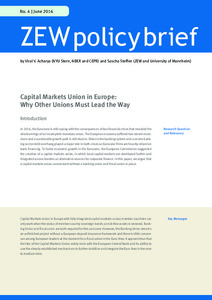Capital markets union in Europe: why other unions must lead the way
"In 2016, the Eurozone is still coping with the consequences of two financial crises that revealed the shortcomings of an incomplete monetary union. The European economy suffered two severe recessions and a sustainable growth path is still elusive. Risks in the banking system and a severe banki...
| Institution: | ETUI-European Trade Union Institute |
|---|---|
| Format: | TEXT |
| Language: | English |
| Published: |
Mannheim
2016
ZEW |
| Subjects: | |
| Online Access: | https://www.labourline.org/KENTIKA-19102032124919202149-Capital-markets-union-in-europ.htm |
| Summary: | "In 2016, the Eurozone is still coping with the consequences of two financial crises that revealed the shortcomings of an incomplete monetary union. The European economy suffered two severe recessions and a sustainable growth path is still elusive. Risks in the banking system and a severe banking sector debt-overhang played a major role in both crises as Eurozone firms are heavily reliant on bank financing. To foster economic growth in the Eurozone, the European Commission suggested the creation of a capital markets union, in which local capital markets are developed further and integrated across borders as alternative sources for corporate finance. In this paper, we argue that a capital markets union cannot work without a banking union and fiscal union in place." |
|---|---|
| Physical Description: | 7 p. Digital |

